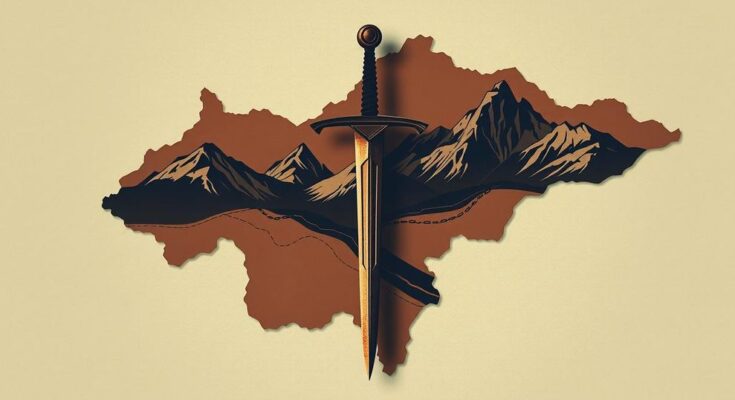The M23 rebel group has taken control of Goma, signaling a significant escalation in the conflict in the DRC. This development has resulted in mass evacuations amid intense military activity. M23’s actions, supposedly backed by Rwanda, have raised international concerns about regional security and humanitarian issues, leading to emergency discussions among global leaders.
The tension between Rwanda and the Democratic Republic of the Congo (DRC) escalated as M23 rebels claimed control of the critical city of Goma. This development is a significant blow to the Congolese military and exacerbates the longstanding conflict that has resulted in numerous casualties and displacements. M23’s offensive has intensified remarkably in recent weeks, prompting mass evacuations as gunfire and explosions filled the city’s atmosphere.
The M23 group is primarily composed of Tutsi fighters and emerged following grievances among Congolese armed forces regarding their treatment. Their resurgence since 2022 highlights a struggle for control over rich mineral resources. The DRC government, along with the United Nations, accuses Rwanda of providing military support to M23, a claim Rwanda denies, complicating regional relations.
Leading up to the capture of Goma, M23 intensified military efforts, taking adjacent towns and culminating in recent assaults that led to the death of the North Kivu military governor. Civilians fleeing conflict sought refuge, but many were uncertain about safety in Goma. This turmoil prompted international discussions regarding the dire situation.
On Sunday night, heavily armed M23 fighters reportedly took Goma amid significant violence. Witnesses described government soldiers surrendering to United Nations peacekeeping forces. M23 asserted its control over the city, commanding remaining Congolese troops to hand over their weaponry. Concurrently, South African soldiers faced casualties in their defense efforts, heightening concerns about regional stability.
The DRC government has reacted strongly, accusing Rwanda of military aggression and cutting diplomatic ties. An emergency UN Security Council meeting was convened to discuss the crisis, receiving support from nations warning against further escalations. Analysts express concern that Goma’s loss strengthens M23’s position, potentially leading to further military advances deeper into the DRC.
As regional leaders consider ceasefire measures, the situation remains precarious, with international actors like the United States urging for peace and accountability. M23’s control of Goma signifies a pivotal moment in the conflict, raising risks of additional displacements and exacerbated humanitarian crises.
The article highlights the complex conflict dynamics between Rwanda and the DRC involving the M23 rebel group. Goma has become a strategic target due to its significant location and proximity to valuable mineral resources. Tensions have escalated amidst accusations of Rwandan governmental support for the M23, complicating the geopolitical landscape in Central Africa. Understanding the historical context of these tensions is crucial in assessing the humanitarian implications for millions involved in this ongoing crisis.
The situation surrounding Goma exemplifies a critical juncture in the conflict involving M23 and its implications for the DRC and the broader region. The capture of Goma not only reveals the power shifts among armed groups but also signifies potential escalations of violence, worsening humanitarian conditions. Diplomatic efforts by regional leaders will be essential in addressing tensions and restoring stability, as history indicates a cyclical nature in conflicts of this nature.
Original Source: www.aljazeera.com




